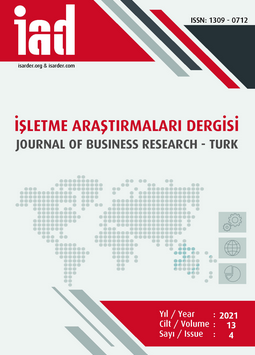Covid-19 Pandemisinin BIST Sektör Endeksleri İle İlişkisi: Bayer – Hanck (2013) Eşbütünleşme Analizi
The Relationship of the Covid-19 Pandemic with BIST Sector Indices: Bayer – Hanck (2013) Cointegration Analysis
Author(s): Ayşegül Ertuğrul Ayrancı, Gizem AriSubject(s): Supranational / Global Economy, Business Economy / Management, Micro-Economics, Health and medicine and law, Financial Markets
Published by: Orhan Sağçolak
Keywords: Covid-19; BIST Sector Indices; Cointegration Analysis;
Summary/Abstract: Purpose – The Covid-19 pandemic, which unexpectedly affected the all of the world, caused serious economic losses as well as death and disease. When evaluated in general, it is seen that the Covid-19 pandemic did not affect every sector equally, while some sectors turned the said negativity into an opportunity, while some sectors came to the point of bankruptcy. The main goal of this research is to investigate the relationship between BIST sectoral indexes and the number of Covid-19 cases. Thus, it will be revealed which sectors have more negative effects for the examined period. Design/methodology/approach – For the daily data including 5 days of the week between 13.03.2020 - 07.05.2021, the relations between the number of covid and BIST sector indices are considered as long and short term. Augmented Dickey-Fuller (ADF) and Phillips-Perron (PP) tests were used to test the stationarity of the data. Final Prediction Error (FPE), Hannan-Quinn (HQ), Schwarz (SW), Likelihood Ratio (LR) and Akaike Information Criteria (AIC) were used to determine the common lag lengths of the variables in the equation system. Bayer-Hanck (2013) Cointegration Analysis was used to determine long-term relationships and error correction model was used to determine short-term relationships. Results – As a result of the analysis, a long-term significant relationship was determined between the other sector indices and the number of covid cases, except for the financial index. In addition, it was observed that the number of Covid cases affected the industry index the most compared to other indexes. Discussion – The results showed that the BIST sector indices experienced a decline during the pandemic process. Uncertainty increases due to the pandemic also brought increased volatility, leading to an increase in investors' risk aversion. However, as an unexpected external effect, the pandemic caused a recession in global financial markets. Considering the extent of the epidemic and its long-term financial effects, it is clear that measures in the form of income transfers, debt postponements, tax/credit facilities, direct funding and guaranteed debt should be increased.
Journal: İşletme Araştırmaları Dergisi
- Issue Year: 13/2021
- Issue No: 4
- Page Range: 3770-3785
- Page Count: 16
- Language: Turkish

